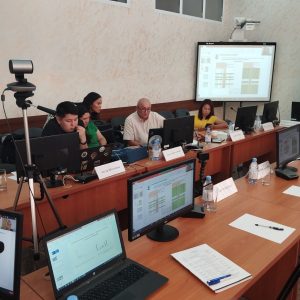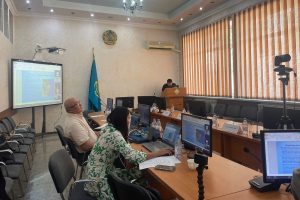
8 -9 August, from 10:00 to 17:00 h, with simultaneous translation in Russian and English languages in LLP “Scientific and Production Centre of Fishery of Fishery” (Almaty) is held IV International Webinar on the theme: “The state of the Caspian seal population (Pusa caspica) – present and future”.
Organiser of the webinar: Institution “Institute of Hydrobiology and Ecology”, with the support of the Committee of Fishery of the Ministry of Ecology and Natural Resources of the Republic of Kazakhstan and “Tengizchevroil” LLP, co-organiser “Scientific and Production Centre of Fishery” LLP of the Committee of Fishery of the Ministry of Ecology and Natural Resources of the Republic of Kazakhstan.
Moderator of the webinar: Isbekov Kuanysh Baibolatovich, General Director of “Scientific and Production Centre of Fisheries” LLP, Doctor of Biological Sciences, Ass. Professor.
N.T. Zhunusov, Chairman of the Fisheries Committee of the Ministry of Ecology and Natural Resources of the Republic of Kazakhstan, made a welcoming speech.
Participants of the webinar are representatives of the Caspian countries, representatives of International organisations of Great Britain, USA, University of Leeds, Institute of Water Problems of the Russian Academy of Sciences, Khazar State Nature Reserve, LLP “Kazakhstan Agency of Applied Ecology”, Caspian Institute of Biological Resources of Dagestan Federal Research Centre of the Russian Academy of Sciences, Republican State Enterprise “Kazgidromet”, Republican State Enterprise “Institute of Microbiology and Biology of the Russian Academy of Sciences”, National Research Centre of the Russian Academy of Sciences.
According to the webinar programme the following reports are planned:
Reference: Caspian seal (Pusa caspica) is the only mammal endemic to the Caspian Sea. It is included in the IUCN Red List as an endangered species. It is included in the List of rare and endangered animal species of Kazakhstan (Resolution of the Government of the Republic of Kazakhstan No. 746 dated 9 November 2020). The species has a similar status in other Caspian countries.



